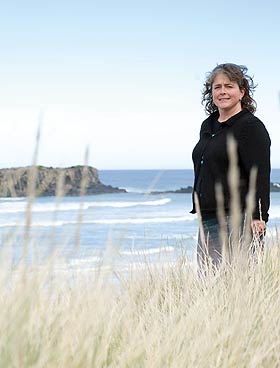
 Nicola Wheen:
Nicola Wheen:
One of the issues that I have with the law is that it has allowed, or created, a situation that enables fishing-related mortality to be managed by the Ministry of Fisheries rather than the Department of Conservation."
Saving New Zealand threatened marine animals, be they dolphins, sea lions or sea birds, is being made more complicated by the way the relevant legislation is spread over three Acts of Parliament, according to Otago Faculty of Law senior lecturer Nicola Wheen.
She says the Marine Animals Protection Law Reform Bill, which she co-drafted with marine researcher Associate Professor Liz Slooten (Zoology) had to address the Fisheries, Wildlife and Marine Mammals Protection Acts.
Their collaboration began when Slooten walked into Wheen's office and said: You're an environmental lawyer. You tell me why it is a protected marine animal can be considered a lawful fishing-related mortality and why it is so hard for us to stop it from happening?"
When I started looking I realised that no one else had had a look,"
Wheen explains, and I began to identify what is it about the law that either allows, or even facilitates, that situation."
For example, there are about 7,000 Hector's dolphins left from a population of about 30,000 in the 1970s, while recent figures put the Maui's dolphin population at only 111.
For dolphins, the two main pieces of legislation are the Fisheries Act and the Marine Mammals Protection Act. The latter is administered by the Department of Conservation and includes a fishing-related mortality regime, but it isn't used. Wheen says the regime that is used actually comes under the Fisheries Act.
One of the issues that I have with the law is that it has allowed, or created, a situation that enables fishing-related mortality to be managed by the Ministry of Fisheries rather than the Department of Conservation," says Wheen. So it is a fisheries issue rather than the focus being on conservation."
She says that current legislation creates an uneven relationship between the Acts and the Ministers, with the Minister of Fisheries holding greatest sway.
Secondly, it is all completely discretionary, meaning no one must do anything, even in relationship to a critically endangered animal."
Their Bill proposed a more precautionary approach, looking to adjust the relationship between the Ministers involved and proposing objectives to guide the management of all marine animals. It was taken to Parliament by the Green Party, but was defeated on its first reading.
Wheen says the Greens may re-ballot the Bill in the fisheries area rather than the conservation area.
What we really need is for these Ministers to have a conversation about what is going on."
